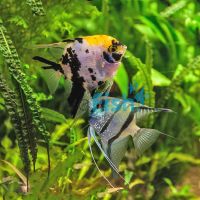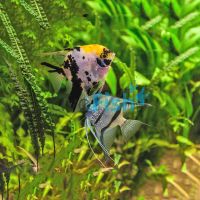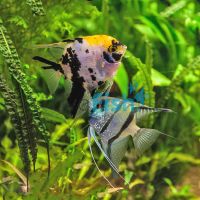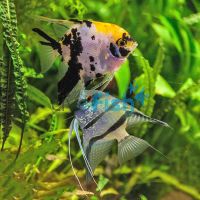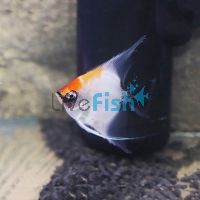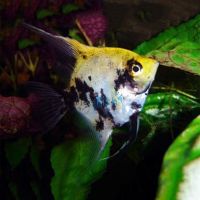Angelfish Care
Angelfish, members of the Cichlidae family, are maybe the most well-known freshwater tropical fish for home aquariums.
Admired for their elegant swimming style, they look great in both big & small fish tanks.
Most Angelfish for sale are captive-bred. In the wild they're silver with black vertical stripes - but by selective breeding, numerous color patterns and long-finned variants called 'veiltails' have been produced over the years. Popular varieties of the Pterophyllum scalare Angelfish include Cobalt Blue, Koi, Amapa Red Back, Manacapuru, Leopard, Zebra Lace and Pearlscale. All these are available here at our online fish shop.
The P. Altum variety is rarely available; P. Leopoldi, as the smallest and most aggressive species of Angelfish, is rarely seen in aquariums.
Natural Habitat

Angel fish are found across tropical South America, including most of the Amazon River.
Usually found in peaceful, slow-moving water in their native environment, they prefer darkly-lit places, like below overhanging foliage, or under fallen trees in the river.
Behavior/Compatibility for Angelfish
While Angelfish are typically placid, cichlids are generally classified as semi-aggressive in aquarium fish shops and may be violent toward one another, particularly when seeking to couple-off and reproduce.
Angelfish are compatible with other community fish but be careful not to overcrowd your tropical fish tank as this can increase aggressive & territorial behaviour.
They shouldn't be kept with fin-nipping species, or with very small fish, as they will devour them without hesitation. This doesn't imply that they're hostile, as many aquarists assume - they're opportunistic eaters that will consume anything that fits into their mouth.
Good tankmates are peaceful Barbs, larger Tetras, Gouramis, Rasboras and Rainbowfish and some of the cutest fishes to watch foraging on the bottom of the tank Corydoras, as well as other smaller catfish such as the Raphael Catfish, which have their own armour for protection. These aquarium fishes are all suitable tank mates, however those that are small enough to fit in the Angelfish's mouth may be eaten.
Keep them well fed so they don't get hungry and turn on their tankmates.
You can also house these fish in bigger tanks alongside Discus.
Housing Angelfish and Aquarium Fish Tank Set-up Tips
Tank
It's possible that your Angelfish may grow up to 25cm (10”) long, but more likely to be around 15cm (6”) and so we recommend a tank no lower than 76 litres (20 gallons) in size, a 208 litres (55 gallons) tank would be best to accommodate fully grown Angels - the larger the aquarium the better.
It's worth noting that as these fish grow tall rather than long, tall aquariums as opposed to wide ones are better for their body type. So, if you're setting up a tropical fish tank and plan to keep Angelfish, keep this in mind when deciding which tank to buy.
To keep the water quality good and ensure you have a low maintenance fish tank that doesn't need excessive water changes, we recommend using a 2.5cm (1”) to 7.5 litres (2 gallons) rule when stocking your tank.
Recommended Max Fish Count Tank Volume 2 Angelfish 181 litres (48 gallons) 4 Angelfish 363 litres (96 gallons) 6 Angelfish 545 litres (144 gallons) 8 Angelfish 727 litres (192 gallons) 10 Angelfish 908 litres (240 gallons) Base
Angelfish feed towards the bottom of the tank, so a fine-to-medium grade substrate is recommended, covering a smooth gravel base.
Foliage
Big broadleaved plants and a densely planted freshwater aquarium, with driftwood placed vertically to resemble felled branches and trees, is ideal to recreate their natural environment. A few floating plants can also be placed for shade and shelter.
Our online aquarium supplies include a wide selection of fish tank accessories that go great with Angelfish, including aquarium plants and fish tank decorations.
Water
Freshwater Angelfish can tolerate a broad range of water temperatures. These tropical fish are native to the Amazon River and so a moderate water flow is appropriate. We also recommend a fish tank air pump for aquariums to ensure that the water is sufficiently aerated. This is especially important when you have a taller (as opposed to wider) tank, as the surface-area-to-volume is reduced - which decreases the natural air diffusion into the tank water.
Angels prefer their tank temperature to be between 25.5 - 29°C (78 - 84°F), with a slightly acidic pH range of 6.0 to 7.5. The hardness should be between 3 - 8°dKH (54 - 145ppm). We stock great pH testing kits.
Depending on where you live, you may also need a water heater.
Keep your tank properly filtered, and do 10% (weekly) or 25% (every other week) water changes. Clean the substrate in your tank with a Siphon Vacuum Gravel Cleaner also on a regular schedule.
Before refilling your tank, if your tap water doesn't match the water advice above, then adjust the chemistry of your tank with one of our water conditioning products, like Easy Balance Plus.
Feeding and Care
Angels are omnivorous, preferring a meat-based diet. In the wild they feed mostly on tiny crustaceans and aquatic invertebrates, but in the home aquarium they'll accept a broad range of meals.
We recommend giving your Angelfish a staple diet of specially prepared cichlid flakes or pellets, as well as lots of live, frozen, and freeze-dried items.
For live food, think: bloodworms, brine shrimp, white worms, as well as small insects and crustaceans. Because these fish are omnivorous, adding some plant matter to their diet in the form of algae wafers or fresh veggies would help them as well. We have a wide selection of fish foods available including pellet, flake, live and freeze dried foods that you can order for delivery to your home.
Great reasons to keep Angelfish in your tropical fish tanks
- Angelfish are a distinctive & attractive species of tropical freshwater fish.
- These cool fishes are a sight to behold while swimming gracefully around your fish tank - and with a variety of colors and designs, they're sure to turn heads.
- They're relatively easy to breed in an aquarium. You can follow this guide on how to breed Angelfish.
Pick which Angelfish variety you would like to keep as fish pets from our available stock now, and we'll get them shipped to your door pronto!
